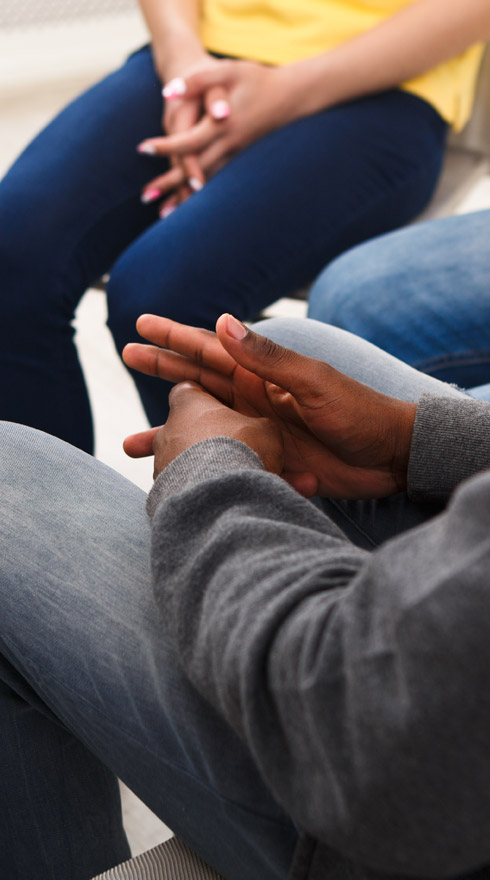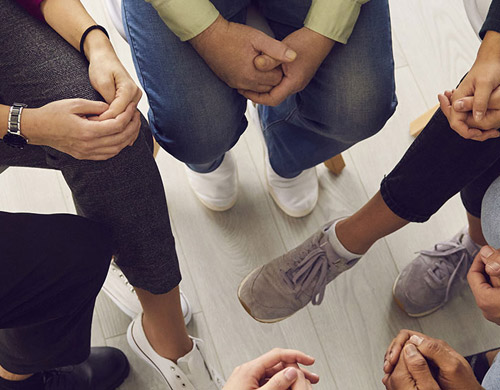If you or a loved one is struggling with a drug or alcohol addiction, it may seem like everything is hopeless and you’re unsure as to where to begin. By using professional addiction rehab services it is possible to treat drug and alcohol addiction just like other diseases and achieve long term recovery.
This page will explain holistic approaches to addiction treatment and how you or a loved one can begin and maintain a sober life.
What is Addiction Rehab (Rehabilitation)?
Addiction ‘rehabilitation’ is a broad term that describes the psychotherapeutic and medical treatments that are used to help people heal their dependencies on illegal drugs or prescribed medications.
Rehab treatment is more effective when it is tailored to your individual needs involving a medically-supervised detox, residential and outpatient care, as well as aftercare support.

Facts & Statistics about Addiction in San Francisco
Prevalence of Substance Use Disorder, by Drug Type
(IN THOUSANDS)
- 2,7578.5%Any Substance
- 2,0886.4%Alcohol
- 1,0683.3%Ilicit Drugs
- 2060.6%Pain Medication
Drug- and Alcohol-Induced Deaths by Age Group, California, 2016
- Alcohol-Induced
- Drug-Induced
- 18 to 250.5
- 9.6
- 26 to 354.3
- 13.9
- 36 to 6424.2
- 22.9
- 65+23.7
- 9.4
Drug Use, by Selected Type and Age Group California, 2015 to 2016
- 12 to 17
- 18 to 25
- 26+
- Marijuana*13.2%
- 34.0%
- 13.5%
- Misuse of Pain Medications3.5%
- 8.0%
- 4.3%
- Cocaine0.8%
- 7.2%
- 1.8%
- Heroin0%
- 0.4%
- 0.2%
What are the treatment options available in San Francisco?
A consolidated treatment approach offers a successful way to tackle the root causes of drug or alcohol addictions. Identifying coping strategies to treat the root causes of your addiction is just as crucial as treating the symptoms of addiction.

Private Residential Programs
Staying at a addiction center and obtaining all of your treatments there is known as a residential rehab program. One of the key benefits is access to 24/7 treatment and guidance. When you leave your home and move into a treatment facility, you can remove yourself from vulnerabilities to triggers that influenced your decision to abuse drugs or alcohol.
By choosing to stay in a safe and supportive environment, you have a better chance of completing your addiction treatment program while limiting the odds of relapse and its associated pitfalls. Inpatient rehab programs are good for individuals with serious alcohol or drug dependencies, co-occurring illnesses or dual diagnosis.
Addiction recovery is attainable if you enroll in a residential rehab program, however if you want to maintain sober living you will have to overcome the difficulties that come with the first year of recovery. Upon completion of your inpatient program, you must consider what you’d like from your new life, as you transition to becoming more independent.
Do You Need Help?
Our addiction advisers are here to help you.

Sober Living Programs
You can build the skills needed to live substance-free by participating in a sober living program, which will guide you through the early stages of recovery. This can be done by:
- A house manager to check in on you every day
- Establishing guidelines for good behavior in recovery
- Getting guidance and companionship from other individuals who have similar challenges
Outpatient Programs
Outpatient rehab programs are usaully quite flexible and allow you to have therapy at the rehab facility and continue your work or family obligations.
Outpatient programs typically provide:
- Education around substance misuse
- Counseling services and therapy through group settings or individual sessions – The duration of outpatient treatment is three months and continue for longer than a year, this is depending on your individual requirements.
Detox Only Programs
A detox program is the first step in rehab and is actioned to address your physical dependency on a drug by removing any trace of it from your system. Withdrawing from drugs or alcohol is the body’s main response to detoxification, as it begins getting used to working without the substance.
This marks the beginning of the recovery process, which continues as you face the underlining causes of your dependency in order to avoid repeating the cycle in the early stages of recovery. It is normal to undergo withdrawal and cravings for some time after the substance has been eradicated from your system. Building on vital skills can assist you to limit your chances of relapse as you adapt to your new life.
Paying for Private Treatment
If you do proceed with private treatment, you can start the process by making a claim via your healthcare provider or pay for treatment yourself. Many insurance providers will allow you to claim at least some of the costs of treatment, including detox, a treatment program, and any medicines you may benefit from. The amount you will be able to claim can be identified by your policy rules and your provider.
We suggest you understand how much cover you have before enrolling in a program. Check out our Verify Your Insurance Page to learn about the cover you qualify for.
If you choose not to claim against your insurance provider, you must pay for your treatment. Many treatment providers provide payment plans to clients who may struggle to pay for treatment upfront.
State Funded Programs
State-funded rehabilitation programs have been created to assist people who do not have the financial resources to deal with an alcohol addiction or drug addiction.
Via federal and state budget funding, these programs may support your recovery by offering:
- Medically-assisted drug/alcohol detox
- Rehab treatment and relapse prevention services.
Those with no private health cover or live in households with low combined income may enroll for a state-funded treatment program. In order to begin the process, you will need to submit:
- Proof that shows you are a US resident
- Proof of income
- Proof of living arrangements
- Medical details about your drug or alcohol addiction issues
Visit https://www.grants.gov/ for further details about the application process.
Follow this document – https://www.samhsa.gov/ – to locate contact details of your state agency.

The following state-funded addiction rehab programs are available in San Francisco:
City and County of San Francisco OBIC
1380 Howard Street, 2nd Floor, San Francisco, CA 94103
415-552-6242
psych.ucsf.edu/zsfg/saamLee Woodward Counseling Center for Women/AARS
1735 Mission Street, San Francisco, CA 94103
415-776-1001
www.healthright360.org/
Maintaining Addiction Recovery in San Francisco
Leaving a rehab center and returning home can be hard for people new to recovery. You had the benefits of professional support in a controlled environment at the rehab center. Once you leave rehab there may be new triggers that put your coping skills to the test. In our experience, clients with intense dependencies and those who do not develop the necessary support structure find long term recovery more difficult when they leave rehab. Without the relevant support and aftercare to guide you in your new life, relapse is a real possibility.
The following AA/NA meetings are available in San Francisco:
AA - 10 Am Big Book
Open, Big Book and English: 2118 Greenwich Street, San Francisco, CA, 94102
Wednesday: 10:00 am – 11:00 am
https://alcoholicsanonymous.com/CA - Room in the Rear
Hybrid and Chips & Speaker Last Friday of the Month:
1320 7th Ave., San Francisco, CA 94122
Friday: 6:30 – 7:30 PM
https://canorcal.org/Recovery at Work "The RAW Group
Open: 1399 McAllister St., San Francisco, CA 94115
Monday: 7:00 PM
https://sfna.org/
Aftercare & Alumni Programs
Aftercare programs provide extended support to you when you leave the rehab center. Because no one can predict what’s going to happen in life, as many as 60% of clients in recovery experience relapse, making ongoing aftercare an important component of addiction recovery.
When your rehab program is close to finishing, we will help identify the therapies and counseling that is helpful for your long-term recovery and any appropriate aftercare plan will be devised to assist you. After completing your rehabilitation program you will be eligible to join an alumni community program so you can stay close to staff and ex-clients.
You will be invited to attend team events, participate in different initiatives, build connections, and receive advice from other members who are also in recovery. You can also reciprocate in the program by supporting other people if you like.
Support Groups (Fellowship Meetings)
Support groups encourage lasting recovery because they recognize the paramount role that social connections play in maintaining addiction recovery. The 12-step model is maintained by support groups like Alcoholics Anonymous (AA) and Narcotics Anonymous (NA) which have a long history in supporting people in recovery by providing group meetings.
Attending support group meetings enables you to listen to other people and inspire others with your own experiences. Friendship, empowerment and taking responsibility for our actions are key to long-term recovery, and meetings provide many with the necessary tools to stay sober.

Support for Families & Children Affected by Addiction
The whole family unit is negatively impacted by a loved one struggling with addiction, and some to a greater extent than others. Support is just as necessary for all family members as it is for the person with the addiction.
Family support groups teach you and your loved ones vital coping strategies for your own life and allow you to offer greater support to the individual who has the dependency. Family members will benefit from joining support groups such as:
- Parents of Addicted Loved Ones
- SMART Recovery Family & Friends
- NAMI Family Support Groups
- Al-Anon
- Families Anonymous
- Alateen
- Nar-Anon










